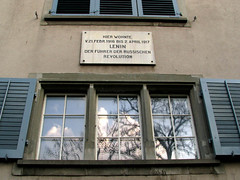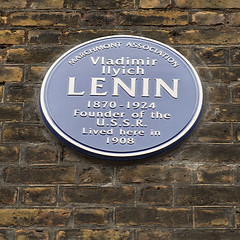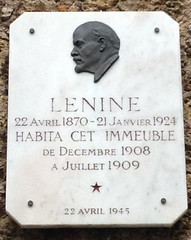Vladimir Lenin


Vladimir Lenin
(1870-1924)
Family tree
Commemorated on 8 plaques
Vladimir Ilyich Lenin 1870-1924 founder of the U.S.S.R. stayed in 1905 at 16 Percy Circus which stood on this site
16 Percy Circus, London, United Kingdom where they stayed
Hier wohnte v. 21. Febr. 1916 bis 2. April 1917 Lenin der Führer der russischen revolution
English translation:
Spiegelgasse 14, Zürich, Switzerland where they lived
Vladimir Ilyich Lenin 1870-1924 Founder of the USSR Lived here in 1908
36 Tavistock Place, London, United Kingdom where they lived (1908)
В этом доме в 1876 - 1877 годах жила семья Ульяновых
English translation: In this house in the years 1876-1877 the Ulyanov family lived
ул. Ленина, 90, Ulyanovsk, Russia where they lived (1876-1877)
Здесь жил Владимир Ильич Ульянов-Ленин 1878-1887 г.г.
English translation: Here lived Vladimir Ilyich Ulyanov-Lenin 1878-1887 gg.
ул. Ленина, 68, Ulyanovsk, Russia where they lived (1878-1887)
Lenine 22 Avril 1870 - 21 Janvier 1924 Habita cet immeuble de Decembre 1908 à Juillet 1909
English translation: Lenin 28 April 1870 - 21 January 1924 lived in this house from December 1908 to July 1909
26 rue Beaunier, Paris, France where they lived (1908-1909)
18 июня 1920 года В. И. Ленин вместе с А. М. Горьким посетил Главное артиллерийское управление Красной Армии
English translation: On June 18, 1920, V. I. Lenin together with A. M. Gorkim visited the General Artillery Department of the Red Army
Sretensky Boulevard, 6/1, building 1, Moscow, Russia where they visited (1920)
18 июня 1920 года В. И. Ленин вместе с А. М. Горьким посетили находившееся в этом здании Главное артиллерийское управление Красной Армии и ознакомились с новым образцом артиллерийской техники
English translation: On June 18, 1920, V. I. Lenin, together with A. M. Gorky visited the Main Artillery Directorate of the Red Army located in this building and got acquainted with a new model of artillery equipment
1 Bobrov Lane, Moscow, Russia where they visited (1920)








